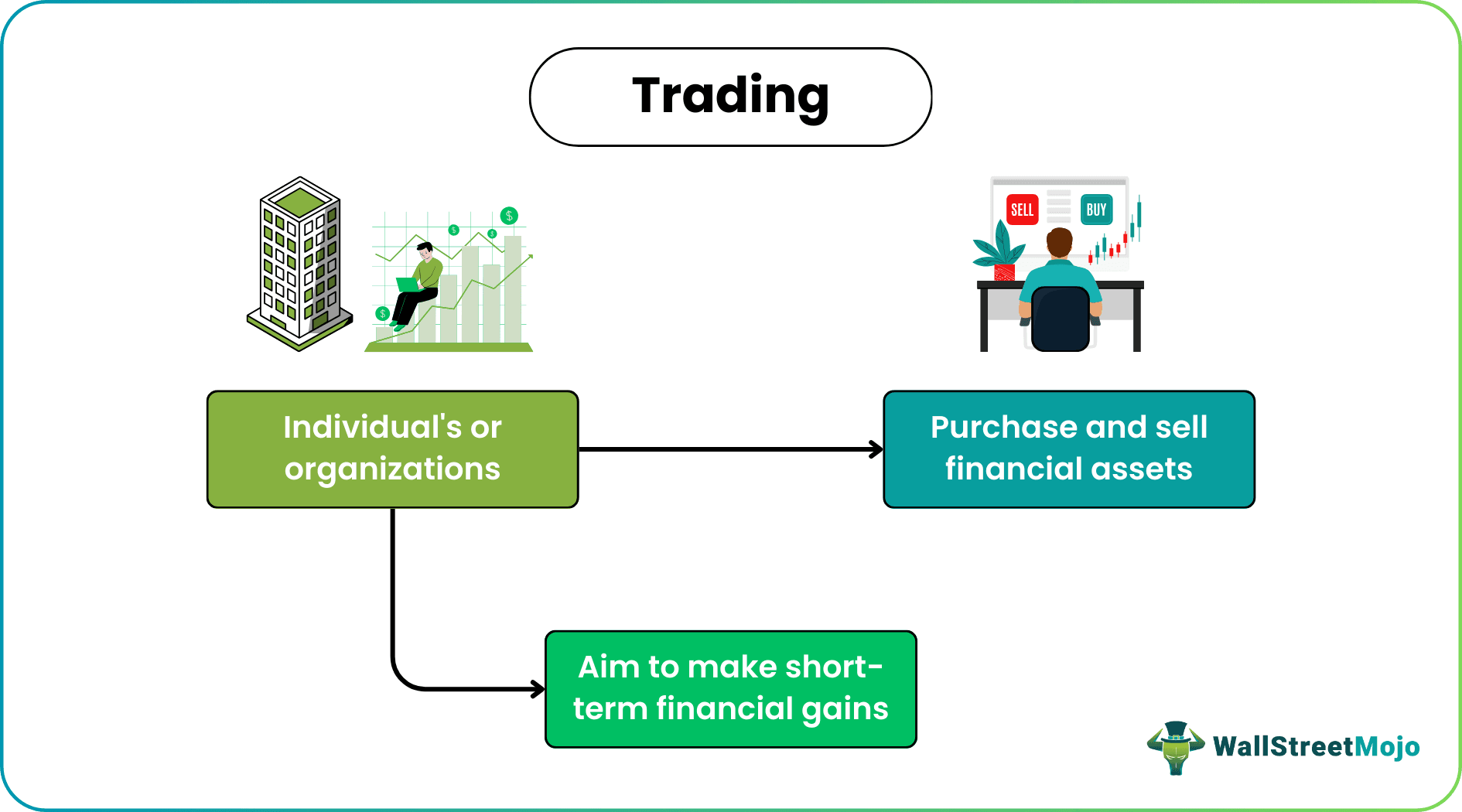Table Of Contents
Trading Meaning
Trading refers to a process that involves the buying and selling of different financial assets, such as stocks, debt instruments, etc., to make a profit in the short term. Its aim is to earn returns that beat the performance of a buy-and-hold strategy.

This process involves carrying out financial transactions frequently, and the persons making trades include institutional investors and financial institutions. The success of any trader generally depends on their ability to remain profitable over time. One must note that trading allows individuals or organizations to leverage economic growth and fulfill their short-term financial objectives.
Table of contents
- Trading Meaning
- Trading refers to a process that involves organizations or individuals buying as well as selling financial assets, such as stocks, commodities, derivatives, etc., frequently with the purpose of making financial gains in the short term.
- In the case of trading, people monitor security prices all the time. On the other hand, people investing in financial assets track security prices occasionally, not continuously.
- A key advantage of trading is that it enables people to get exposure to global markets.
- A noteworthy disadvantage of this process is that it can lead to significant losses for traders.
Many traders use Saxo Bank International to research and invest in stocks across different markets. Its features like SAXO Stocks offer access to a wide range of global equities for investors.
Trading Explained
Trading refers to the purchase and sale of financial securities to achieve short-term financial objectives. Individuals performing the transactions do not hold the assets for a long period. They only purchase those securities that can help them generate returns quickly. However, one must note that people can suffer significant losses if they buy or sell the wrong financial assets at the wrong time.
The basic fundamental of this process is to purchase financial assets when their price is low and sell them when their price is high. That said, there are various other trading strategies, for example, short-selling, which typically seasoned traders utilize to generate significant financial gains in the short term. Experts do not recommend such strategies to individuals new to financial markets because of the high risk level associated with them.
In financial markets, there are two ways to carry out trades — one is via an exchange, and another is through over-the-counter buying and selling of securities. Exchanges refer to marketplaces facilitating the trade of a specific kind of instrument, for example, the Chicago Mercantile Exchange and the New York Stock Exchange. On the other hand, over the counter (OTC) trades involve trade directly conducted between a couple of parties. Placing any trade via a broker is an example of an OTC trade.
Trading Assets
Traders engage in buying and selling different kinds of financial assets. Let us understand how trading each asset type works.
- Stock: Traders buy and sell stocks on the basis of their prediction regarding their future price movements. They enter a long position if they are expecting the price to rise. On the other hand, they enter a short position if they think the price will fall. If their speculation turns out to be correct, they will make a profit.
- Forex: Forex trading involves exchanging a currency for another. When buying and selling forex, people speculate on whether a currency’s price will increase or decrease.
- Index: It involves buying and selling a number of underlying assets grouped together into a single entity. When trading on an index, people trade on all constituents simultaneously. The different types of indices one can trade include bonds, sectors, equity, real estate investment trusts (REITs), and commodities.
- Exchange-Traded Funds: Individuals can trade exchange-traded funds (ETFs) during market hours like stocks. Note that people can buy and sell such financial instruments on stock exchanges.
- Commodities: Traders buy and sell commodities, such as gold, oil, or other physical substances, to make financial gains in the short term. The daily purchasing and selling of such commodities depend on market opportunities or expected economic trends.
- Derivatives: A derivative trader purchases and sells financial contracts deriving their value from underlying assets, for example, stocks and commodities. One may engage in trading such contracts to speculate on price movements and hedge against financial risk.
The above were some popular financial assets that traders buy and sell to achieve their financial goals.
Types
Let us look at the details concerning the different types of trading in financial markets in detail.
- Binary: Binary trading involves predicting whether the price of an asset will rise or fall within a specific timeframe. Traders essentially make a ""yes"" or ""no"" proposition, betting on whether a market will be above a certain price at a specific time. This simplified approach offers fixed risk and reward, making it accessible for beginners, though it requires accurate market direction forecasting to be profitable.
- Swing: In this case, a trader usually buys a financial security and holds the same for a period ranging from a few days or a week to profit from short-term price movements. One must have sufficient knowledge related to the assets to carry out trades successfully and earn profits.
- Micro Or Scalping: This type of trading involves people purchasing and selling securities in large quantities multiple times in a day. Individuals or organizations can earn profits by adopting this approach. That said, one must remember that people might incur significant losses when using this method.
- Day: In this case, traders purchase and sell financial assets on the same day. This means individuals hold the securities for a few minutes or hours before selling.
- Momentum: When trading stocks or any other financial asset using this approach, an individual purchases security that are increasing in price and sell them when it appears that they have reached their peak in terms of price. In short, this approach involves traders aiming to make the most of the continuance of the trends existing in a market.
Examples
Let us look at a few trading examples to understand the concept better.
Example #1
Suppose David is a person who wishes to engage in trading and fulfill his short-term monetary needs. He opened a trading account with a broker and decided to utilize the momentum strategy to make financial gains. David decided to buy shares of ABC company as its price skyrocketed over 25% in the past 7 days.
After he bought the shares, the stock price surged 12% within 3 days. As many experts suggested that the stock had reached its peak, he decided to offload the shares and realize gains worth $20. It turned out to be the right decision as the share price started dropping after that.
Example #2
The trading of HDFC shares stopped in July 2023 after the company’s merger with HDFC Bank. Shares of the mortgage behemoth closed at a price of ₹2,730, which gave the lender a substantial market value of more than ₹5 lakh crore. The shareholders of HDFC, who had witnessed a compound annual growth rate or CAGR of 19%, got 42 shares of HDFC Bank for every 25 shares held by them.
Advantages And Disadvantages
Let us look at the benefits and limitations of trading stocks and other financial assets.
Advantages
- When people use trading strategies efficiently, they can earn substantial profits.
- This process allows individuals to take advantage of economic growth.
- The process is inherently flexible. Traders can buy or sell their financial assets when they want to fulfill their objectives.
- It allows for portfolio diversification.
- This process can provide investors with exposure to international markets.
- Individuals can buy and sell securities frequently to manage portfolio risk.
Disadvantages
- Organizations and individuals can incur substantial losses if they do not trade using a prudent strategy and make poor decisions.
- Markets are unpredictable because of the dynamic economic environment. Different factors, like geopolitical events, can disrupt buying and selling strategies in financial markets. Simply put, market volatility can make it difficult for traders to generate profits consistently.
- Many people tend to overtrade, which leads to high transaction costs. Such costs negatively impact profits.
- This process requires traders to spend a lot of time carrying out analysis and research. Moreover, one must have adequate knowledge regarding financial markets to trade securities.
For professional-grade stock and crypto charts, we recommend TradingView – one of the most trusted platforms among traders.
Disclosure: This article contains affiliate links. If you sign up through these links, we may earn a small commission at no extra cost to you.
Frequently Asked Questions (FAQs)
No, the frequent buying and selling of financial assets is not gambling when people know what they are doing exactly. One must have sufficient knowledge regarding the financial markets before engaging in this activity. Also, they must conduct thorough research and analysis to pick the right securities at the right time.
Whether or not one should trade depends on two crucial factors which are —
- Financial goals
- Risk appetite
If one is risk-averse and wishes to adopt a conservative approach, trading is not an ideal way to make financial gains. Also, one with long-term financial goals might not want to perform transactions frequently.
They still exist. That said, one must note that they are limited with regard to their capacity and scope. This is because algorithmic trading and screens have replaced them.
Yes, it is legal for individuals or organizations to utilize such bots to trade financial assets.
Recommended Articles
This article has been a guide to Trading and its meaning. Here, we compare it with investing and explain its assets, types, examples, advantages, and disadvantages. You may also find some useful articles here -

